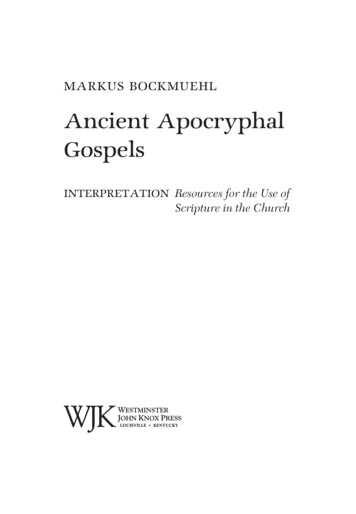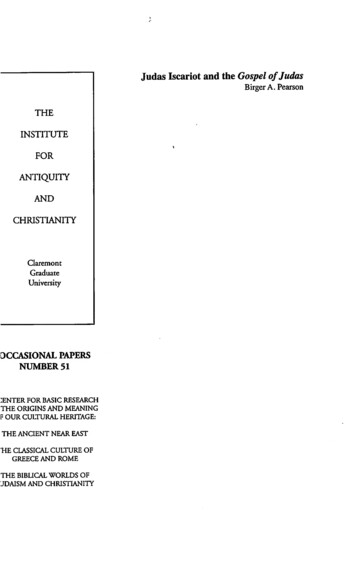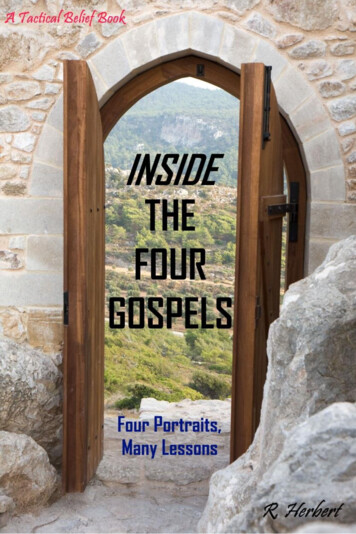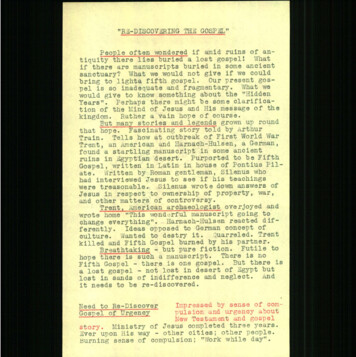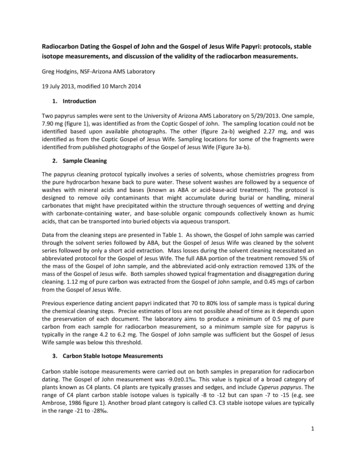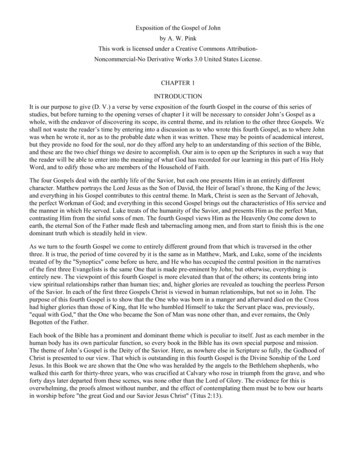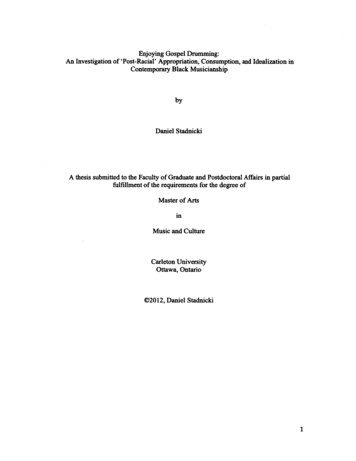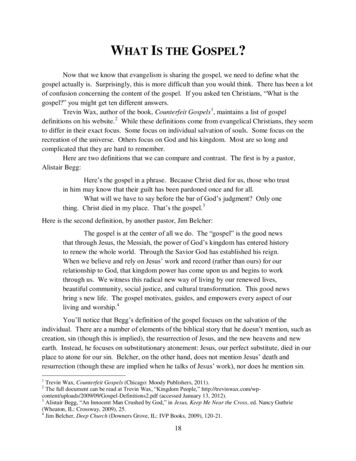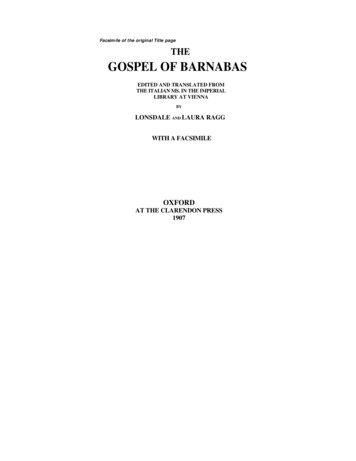
Transcription
The Gospel’s Implicationson Seeking JusticeA 5-Week Bible Study on the Book of James
NotesOutline of study:WEEK 1 Context, Reading the Book of James as a letter, anddiscovering major themesWEEK 2 The Foundation for Godly Living – The Gospel of JesusWEEK 3 Fruit #1 - Wisdom from GodWEEK 4 Fruit #2 - Impartial, Merciful, Pursuit of othersWEEK 5 Fruit #3 - Generous and Just Living** This study can be done individually or with a group. Either way, wepray that it encourages you in your walk with Jesus!2The Gospel’s Implications on Seeking JusticeThe Gospel’s Implications on Seeking Justice3
Week 1Understanding theBook of JamesJames 1:1 - 5:19NotesGoal for this week:To read through the book of James in its entirety, to evaluate thehistorical context and literary features of the book, and to beginidentifying high-level themes to lay the foundation for a morein-depth study in the following weeks.Background and Context(read through as a group and discuss)1. Who is James?A. Most scholars agree he is James of Jerusalem, whom Paul called “the Brother of the Lord” in thebook of Galatians.B. Was visited personally by the Lord Jesus after his resurrection.C. Was with the apostles at Pentecost.D. Acts 15 and 21 indicate that James rose to become the leader of the Jerusalem church by AD 50.2. When is he writing this?A. Most likely sometime between A.D. 44-49.B. James was likely the earliest recorded Christian document, written just more than a decade after Jesus’death and resurrection. Its writing reflects the beginning stages of the Church’s theological thinking.3. To whom is the letter written?A. Written predominately to scattered Jewish believers living under pressure.n Church members were not facing direct martyrdom, but the church was facing extreme economicoppression and suffering.n Readers of this letter were facing pressure to compromise their faith and lifestyle via socialrejection and economic disadvantages.4. What is his purpose in writing?A. To challenge believers to examine their faith to see if they were genuinely living it.B. To remind believers that the foundation of our faith is the gospel of Jesus.C. To explore the impact of outward faithfulness in the world.4The Gospel’s Implications on Seeking JusticeThe Gospel’s Implications on Seeking Justice5
NotesRead through the entire letter as a group.1. Underline phrases, concepts, orterms you see more than once.Such as:A. Faith - 1:2-4, 2:14-26, 5:15B. Wisdom - 1:5, 3:13-18C. Prayer - 1:5, 5:13-18D. Poor vs. Rich - 1:9-11, 2:2-7, 5:1-6E. Justice - 1:27, 2:15-17, 4:11-12, 5:4, 5:13-15Before the next lesson:2. Discuss the following: A. Which theme or Scripture jumped out to you?B. What do you think James wanted his readers togain from his letter? (Consider the situation inwhich he was writing his letter.)n Think about the letter as whole. What wouldyou consider to be the main idea of thisbook? (Have everyone try to summarize itin 1-2 sentences)n Example:“Heaven is our true home made possiblethrough the sacrificial death andresurrection of Jesus. Therefore, let yourlives on earth be marked by Spirit-filled,transformed lives of generosity, justice, anda character that reflects the heartof God.”6The Gospel’s Implications on Seeking JusticeThe Gospel’s Implications on Seeking Justice7
Week 2Foundation for Godly Living The Gospel of JesusIntro Question: What is the most memorable gift you ever received?Who gave it to you? What was the occasion?NotesJames 1:18Main Idea:God’s work of restoring the world begins first in our ownhearts and then moves outward.Summary of Chapter 1:1-17In the fi rst 17 verses of Chapter 1, James introduces a set of themes that he will expand upon inthe rest of his letter. He introduces themes of trials/endurance, wisdom, wealth, and temptation.For the purpose of this week’s lesson, we are going to focus only on verse 18. As you readthrough the entire letter last week, you may have started to feel like the book of James is just abig list of do’s and don’ts of the Christian faith. This might make you feel overwhelmed,shameful, or even discouraged.These feelings are not what James had in mind. Instead, he hoped that his readers would onceagain be refreshed in the joy that comes from the gospel when we realize Christ has redeemedour lives through his death and resurrection. As we now stand in His grace, we get to live livesthat honor him and bring hope and healing to the world.8The Gospel’s Implications on Seeking JusticeThe Gospel’s Implications on Seeking Justice9
Read the Passage (James 1:18):Notes18 He chose to give us birth through the word of truth, that we mightbe a kind of first fruits of all he created.NotesIn short, James wants us to think of ourselves as the first, orprimary, representation to the rest of the world of what Godhas accomplished through Christ.n Why would it be important for His ‘first representations’Understanding a Bible passage requires knowing the context.Sometimes the context we need to see is much larger than theimmediate context of the verse in front of us. James 1:18 is one ofthose passages. To this end, read James 1:1-7, John 3:1-8 andRomans 6:23.Our need for a savior (“give us birth”)1. In the light of these passages:n What kind of birth is James talking about?n W hy did James think it was important to tell us that Godto be committed to obeying the one who saved them?n In what ways is God’s grace displayed to the worldas His followers represent His character throughtheir actions?n What firstfruits do we want friends on campus to seein us?2. How does the gospel (or word of truth) free us from shame andguilt and instead give us joy, hope, and perseverance as we seekto obey God’s word?chose to give us birth?2. What are some things that you experienced as a result of yourown separation from God before you came to Christ?The Savior revealed in Christ (“through the word of truth”)1. Read 1 Corinthians 15:1-4. In light of this text, what is the wordof truth to which James refers in 1:18?n What did Christ do for us?n H ow does someone receive the benefit of what Christ didKey takeawaysn Jesus’ sacrificial death and resurrection on the cross hasopened a way for restored fellowship with God and a newway to live life.n Receiving the grace of God lays the foundation forobeying God in all areas of our lives and representingHim to the world.for us?New life in the Savior (“that we might be a kind of firstfruits”)1. James says that the word of truth wasn’t only to give you andme new birth, but also so that ‘we might be a kind of firstfruitsof all He created’. The term ‘firstfruits’ is used numeroustimes throughout the Old Testament to describe the ‘first of’something.10The Gospel’s Implications on Seeking JusticeThe Gospel’s Implications on Seeking Justice11
Week 3Gospel Fruit #1 Wisdom From GodJames 3:13-18NotesIntro Question: Think about a time in your life when you’ve asked God forwisdom regarding a certain situation or decision you needed to make.Was His answer what you expected? If you applied the wisdom He gave you,what happened?Main Idea:The wisdom from heaven that God gives us is othersfocused and when applied, God uses it to restore the worldthat has been broken by sin. When we adhere to the wisdomof the world, destruction arises.Read the Passage (James 3:13-18):Who is wise and understanding among you? Let them show it by their good life, by deeds done inthe humility that comes from wisdom. 14 But if you harbor bitter envy and selfish ambition in yourhearts, do not boast about it or deny the truth. 15 Such “wisdom” does not come down from heaven but isearthly, unspiritual, demonic. 16 For where you have envy and selfish ambition, there you find disorderand every evil practice.13But the wisdom that comes from heaven is first of all pure; then peace-loving, considerate, submissive,full of mercy and good fruit, impartial and sincere. 18 Peacemakers who sow in peace reap a harvestof righteousness.1712The Gospel’s Implications on Seeking JusticeThe Gospel’s Implications on Seeking Justice13
NotesJames 3:13 -- Christ crucified, which is the wisdom of God, produces the humility that leadsto godly action.1. Read 1 Corinthians 1:18-31 and discuss how Paul makes a similar contrast when he refers to theGospel message of Christ crucified as the “wisdom of God”.Notes(Q uestion 2 continued)n If you embodied this characteristic more fully in your life, how would it transform theworld around you? How would it help show others the ‘first fruits’ mentioned inJames 1:18?n How does heavenly wisdom produce humility?James 3:14-16 -- The wisdom of the world and its fruits.1. What does James mean by “bitter envy” and “selfish ambition”? How do these things reflect the“wisdom of the world”?n How might you apply this wisdom from heaven to your life today? How would it changea situation that you’re in to help showcase who Christ is more fully?2. How have you seen envy/selfish ambition create disorder and evil in your own life or in the worldaround you?3. What are the two commands that James gives us if we are struggling with bitter envy and selfishambition? How would obeying these commands lead to the kind of humility that comes fromwisdom?James 3:17 -- Characteristics of the wisdom from Heaven.1. Read James 1:5. How does James say that we get the wisdom from Heaven?Key takeawaysn The gospel should produce humility in our hearts; humble hearts will live out thewisdom from heaven.2. For each of the following characteristics, discuss the following:n How did Jesus embody this characteristic while on earth?n Is this characteristic more inward focused or others-focused? Why do you think so?Pure - Not polluted by theworld, perfect--like gold – seeJohn 7:1-9.Peace-loving - an activepursuit to be at peace withGod and seek peace betweenimage bearers – seeMatthew 18:21-22.Considerate or Gentle- Thoughtful, kind,understanding; not harsh –see Matthew 11:28-30.Submissive - Obedient tothe word of God and to theauthority of others – seeJohn 13:12-15; 15:9-10.Full of mercy and good fruit- showing forgiveness andn The wisdom of heaven is focused on others and will help restore the creation that hasbeen broken by sin.n The wisdom of the world only produces destruction.compassion when none isdeserved, free and joyfulgenerosity – see Matthew9:10-13.Impartial - Unbiased in lovingimage-bearers – seeJohn 4:7-10.Sincere - Truthful, honest,genuine – see John 5:30;7:16-18.14The Gospel’s Implications on Seeking JusticeThe Gospel’s Implications on Seeking Justice15
Week 4Gospel Fruit #2 Impartial, Merciful, Pursuitof OthersJames 1:22 - 2:13Intro Question: When is a time that you have wrongly assumed somethingabout someone based on a difference (economic, racial, lifestyle) theyembodied? What was the result of that false assumption?Main Idea:The word of God will transform our hearts to act withimpartiality and mercy towards all image bearers,especially the most vulnerable in our worldRead the Passage(James 1:22-2:13):Do not merely listen to the word, and so deceiveyourselves. Do what it says. 23 Anyone who listensto the word but does not do what it says is likesomeone who looks at his face in a mirror 24 and,after looking at himself, goes away and immediatelyforgets what he looks like. 25 But whoever looksintently into the perfect law that gives freedomand continues in it—not forgetting what they haveheard, but doing it—they will be blessed in whatthey do.22Those who consider themselves religious and yetdo not keep a tight rein on their tongues deceivethemselves, and their religion is worthless. 27Religion that God our Father accepts as pure andfaultless is this: to look after orphans and widowsin their distress and to keep oneself from beingpolluted by the world.26Chapter 2116The Gospel’s Implications on Seeking JusticeNotesMy brothers and sisters, believers in our gloriousLord Jesus Christ must not show favoritism.Suppose a man comes into your meeting wearinga gold ring and fine clothes, and a poor man infilthy old clothes also comes in. 3 If you show specialattention to the man wearing fine clothes and say,“Here’s a good seat for you,” but say to the poor man,“You stand there” or “Sit on the floor by my feet,” 4have you not discriminated among yourselves andbecome judges with evil thoughts?2Listen, my dear brothers and sisters: Has notGod chosen those who are poor in the eyes ofthe world to be rich in faith and to inherit thekingdom he promised those who love him? 6 Butyou have dishonored the poor. Is it not the richwho are exploiting you? Are they not the oneswho are dragging you into court? 7 Are they notthe ones who are blaspheming the noble name ofhim to whom you belong? 8 If you really keep theroyal law found in Scripture, “Love your neighboras yourself,” you are doing right. 9 But if you showfavoritism, you sin and are convicted by the law aslawbreakers. 10 For whoever keeps the whole law andyet stumbles at just one point is guilty of breakingall of it. 11 For he who said, “You shall not commit5The Gospel’s Implications on Seeking Justice17
NotesJames 2:1-7 -- Favoritism based on outward appearancesis sin.(passage continued)adultery,” also said, “You shallnot murder.” If you do notcommit adultery but do commitmurder, you have become alawbreaker.Speak and act as those whoare going to be judged by the lawthat gives freedom, 13 becausejudgment without mercy will beshown to anyone who has notbeen merciful. Mercy triumphsover judgment.12James 1:22-27 -- Christ followers read and obey the wordof God.1. What are the differences between the ‘man who looks inthe mirror’ and the believer who ‘looks intently into theperfect law’?2. According to James, what are some things that mark a ChristianNotes1. What are some ways that Christians show favoritism? How haveyou personally shown favoritism in your own life?n What are our real values if we treat people differently becauseof their external appearance, status, job, or income level?n How does the Gospel challenge the way we treat one anotherbased on ‘worldly’ characteristics like money or status?James 2:8-9 -- The royal law in scripture has its foundation inthe gospel.1. Read Luke 10:25-37n What does this parable teach us about what James calls “theroyal law”?n Who is the neighbor Jesus is referring to in this parable?who is reading and obeying the word of God?n With whom did Jesus spend the majority of His time? Thinkof the people He sought out. Read John 4 for reference.n If you are consumed with worldly passions (wealth, status,pleasure), in what ways may you be less likely to noticewhen a widow or orphan needs your help?** If you’re reading the word of God consistently, you will notice that God isvery concerned with the most vulnerable of society (orphans, widows, etc). Asyour heart for Him grows, your heart to serve these image-bearers will as well.James 2:9-13 -- Jesus is our merciful Judge. Reflect Him tothe world.1. How has God shown you mercy instead of judgment? How doesthis free you up to be merciful towards others?Key takeawaysn God calls his followers to act with impartiality and mercytowards all, especially those most vulnerable.n God’s word gives us the eyes to see those on the fringe ofsociety who need to see Jesus’ love and compassion.18The Gospel’s Implications on Seeking JusticeThe Gospel’s Implications on Seeking Justice19
Week 5Gospel Fruit #3 - GenerousJusticeJames 2:14-26, 4:13 - 5:6Intro Question: Suppose you go to the doctor with an illness thatyou’re dealing with. After the checkup, the doctor tells you that you need aprescription called Penicillin in order to be healed. After telling you this, hesays, “Thanks for coming in, I hope you feel better!” but doesn’t bother to writethe prescription for you. How would you feel in that moment? What would youbelieve about the doctor or the hospital that they represent?NotesMain Idea:Faith in the grace of Jesus compels us to seek justice forthose in need with joyful generosity.We’re going to explore 3 passages in James to help us consider this gospel fruit:Read the Passage(James 2:14-26):What good is it, my brothers and sisters,if someone claims to have faith but has nodeeds? Can such faith save them? 15 Supposea brother or a sister is without clothes anddaily food. 16 If one of you says to them, “Goin peace; keep warm and well fed,” but doesnothing about their physical needs, what goodis it? 17 In the same way, faith by itself, if it is notaccompanied by action, is dead.14But someone will say, “You have faith; I havedeeds.”18Show me your faith without deeds, and I willshow you my faith by my deeds. 19 You believethat there is one God. Good! Even the demonsbelieve that—and shudder.20The Gospel’s Implications on Seeking JusticeYou foolish person, do you want evidencethat faith without deeds is useless? 21 Was notour father Abraham considered righteous forwhat he did when he offered his son Isaacon the altar? 22 You see that his faith and hisactions were working together, and his faithwas made complete by what he did. 23 Andthe scripture was fulfilled that says, “Abrahambelieved God, and it was credited to him asrighteousness,” and he was called God’s friend.24You see that a person is considered righteousby what they do and not by faith alone.20In the same way, was not even Rahab theprostitute considered righteous for what shedid when she gave lodging to the spies andsent them off in a different direction? 26 As thebody without the spirit is dead, so faith withoutdeeds is dead.25The Gospel’s Implications on Seeking Justice21
Notes1. Why does James ask the question, “can such faith save them?”2. How is a person who doesn’t help a brother or sister in need not acting in faith-oriented love?3. Why should the gospel motivate someone to be naturally generous towards those in need?James 2:18-26 -- An apologetic for faith accompanied by good deeds.NotesRead the Passage (James 5:1-6):James 2:14-17 -- Generous deeds validate that someone’s heart has been transformed bythe gospel of Jesus.Now listen, you rich people, weep and wail becauseof the misery that is coming on you. 2 Your wealthhas rotted, and moths have eaten your clothes. 3Your gold and silver are corroded. Their corrosionwill testify against you and eat your flesh like fire.You have hoarded wealth in the last days. 4 Look!The wages you failed to pay the workers who mowed1your fields are crying out against you. The cries ofthe harvesters have reached the ears of the LordAlmighty. 5 You have lived on earth in luxury andself-indulgence. You have fattened yourselves inthe day of slaughter. 6 You have condemned andmurdered the innocent one, who was notopposing you.1. Why does James say that belief in God that is not accompanied by good works is not saving faith? Whydoes he use the example of demons?2. What did Abraham have to believe about God as he obeyed God’s command to sacrifice his only son?How does this point us back to the good news of Jesus?James 5:3b-6 -- Injustice thrives where there is selfish ambition, greed, and a disregard forhuman dignity.1. What forms of injustice are present in this text?Read the Passage (James 4:13-17):Now listen, you who say, “Today or tomorrow wewill go to this or that city, spend a year there, carryon business and make money.”14Why, you do not even know what will happentomorrow. What is your life? You are a mist thatappears for a little while and then vanishes.13Instead, you ought to say, “If it is the Lord’s will,we will live and do this or that.” 16 As it is, you boastin your arrogant schemes. All such boasting is evil.17If anyone, then, knows the good they ought to doand doesn’t do it, it is sin for them.152. When James says, “The cries of the harvesters have reached the ears of the Lord Almighty,” what doesthat tell you about God’s character?3. Watch this 2 minute video (https://www.youtube.com/watch?v QGALXBR CCg) of 3 young boysexplain what it’s like to be a child slave on Lake Volta in Ghana.n W hat does this parable teach us about what James calls “the royal law”?The consequences of those who are greedy and self-focused. (5:1-3a)1. What does James say will happen to people who exploit others for selfish gain? What should thisYour life is shorter than you think. (4:13-14)1. What does this person value in life based on how they plan and spend their time?2. How should the reality that you could die today change the way you spend or give your money/time?3. What are some ways in which you don’t trust God with tomorrow revealed by how you spend yourmoney, use your time, and who/when you serve?Key takeawaysn Christ followers should be naturally inclined toward generosity. In what ways is Godchallenging you to be more generous?n Seek justice on behalf of the oppressed around the world.Pursuing generosity today shows you how to trust God with tomorrow. (4:15-17)Host an IJM Freedom Fast with your small group – go to www.ijm.org/freedomfast to sign up1. What does the person in verse 15 value or believe that’s different than the person described in verse 13?Launch an IJM Campus Chapter at your university – learn more here (www.ijm.org/students)2. Why does giving generously today cause us to trust God more deeply?22warning do in our own hearts? How does this point us back to the good news of Jesus?The Gospel’s Implications on Seeking Justicen Learn more about IJM’s work (www.ijm.org/our-work) to rescue and restore the 40 millionpeople living in slavery.The Gospel’s Implications on Seeking Justice23
To read through the book of James in its entirety, to evaluate the historical context and literary features of the book, and to begin identifying high-level themes to lay the foundation for a more in-depth study in the following weeks. Background and Context (read through as a group and discuss) Week 1 Understanding the Book of James James 1:1 .

